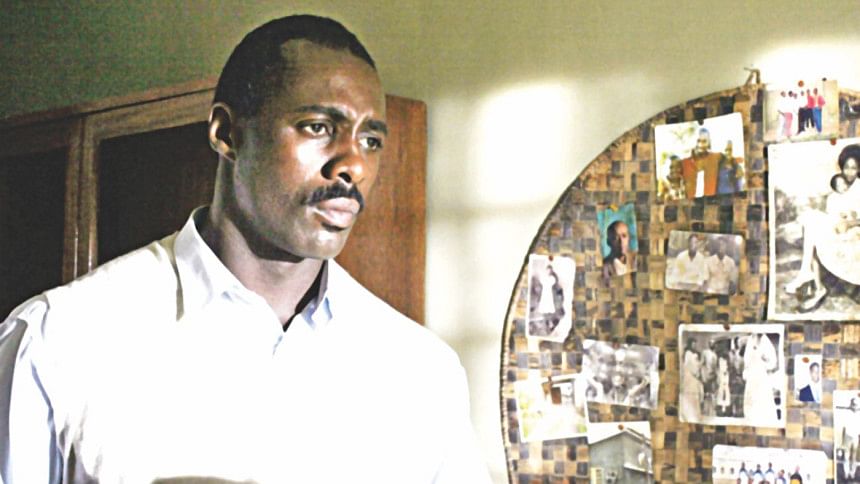Of war and its aftermath

"Marcus (the son): So when I grow up, my I.D. card will say "Hutu"?
Augustin (the father): Yes. But one day, I hope that it will just say "Rwandan"."
If you lived in Rwanda during the 20th century, you would often be asked about your tribe. It could either be the majority Hutu or the minority Tutsi. Back then, they used to coexist with the rising tensions among them. It was only after the Belgians left, putting things in favor of the majority Hutu from the earlier ruling class Tutsi, that the age-old hatred against the minority Tutsis formed a grim shape, triggering a barbaric killing spree.
It's raining cats and dogs on the April 7, 2004, the national day of remembrance, as though the Rwandan sky is mourning for the victims. When Augustin (played by Idris Elba) drives home, he receives a letter from his brother Honoré, who was proven a war criminal for operating a radio show which used to propagate hatred against the minority when the country was on the brink of being torn apart. He asks him to be present during his court confession in Tanzania.
Augustin is a Hutu Army officer, whose wife, Jeanne is a Tutsi. They reside in the capital Kigali with both their sons while their daughter Anne Marie lives in a Catholic boarding school, away from the capital. The fact that Jeanne belongs to the minority and she is married to a Hutu man puts their family in a predicament. In the film Sometimes in April, the emerging Hutu power is seen inciting hatred against the Tutsi, irrespective of family, friends, neighbors, and beyond, as had happened during the actual time period. But that's just in 1994. The film also fast forwards 10 years to show Augustin witnessing his brother's confession and swings back and forth, although it mostly sheds light on the happenings of 1994. 10 years since the genocide, Augustin, who seems to remain unsettled about his wife and children's fates, finally gets all the answers from Honoré.
Unlike Hotel Rwanda, this film begins with a narration that is brief, necessary, and just informative enough, narrating the country's history and its contribution to the genocide. So it doesn't really make the viewers restless by the lack of proper context. Other than the genocide, it captures the international reactions against the backdrop of Kurt Cobain's death and how the fear that had stemmed from the battle of Mogadishu obstructed the US from sending soldiers to the country amidst the rising upheaval. There is both normality (on the surface) and a sense of discomfort throughout the progression. When it gets to 2004, things seem to have returned to normal, with sadness lurking in the shadows as the lasting aftermath. And when it's 1994, things are anything but. The Tutsis are showed no mercy. They're called cockroaches and massacred. Their mutilated bodies fill the streets and ditches. The looted houses are burning, the cars damaged and abandoned on the streets — these scenes would remind one of a zombie apocalypse. Only, a zombie apocalypse has never happened, but the genocide did.
Though I was expecting less from this film after watching Hotel Rwanda, the extent of reality it could capture truly surpassed my expectations. I think there's a formula the films that portray genocides follow — the sadder it is, the closer it gets to the reality. Packed with suspenseful moments, violent scenes, and sadness, Sometimes in April is a history lesson for the world to see humanity at its lowest, through the eyes of a genocide survivor.

 For all latest news, follow The Daily Star's Google News channel.
For all latest news, follow The Daily Star's Google News channel. 



Comments